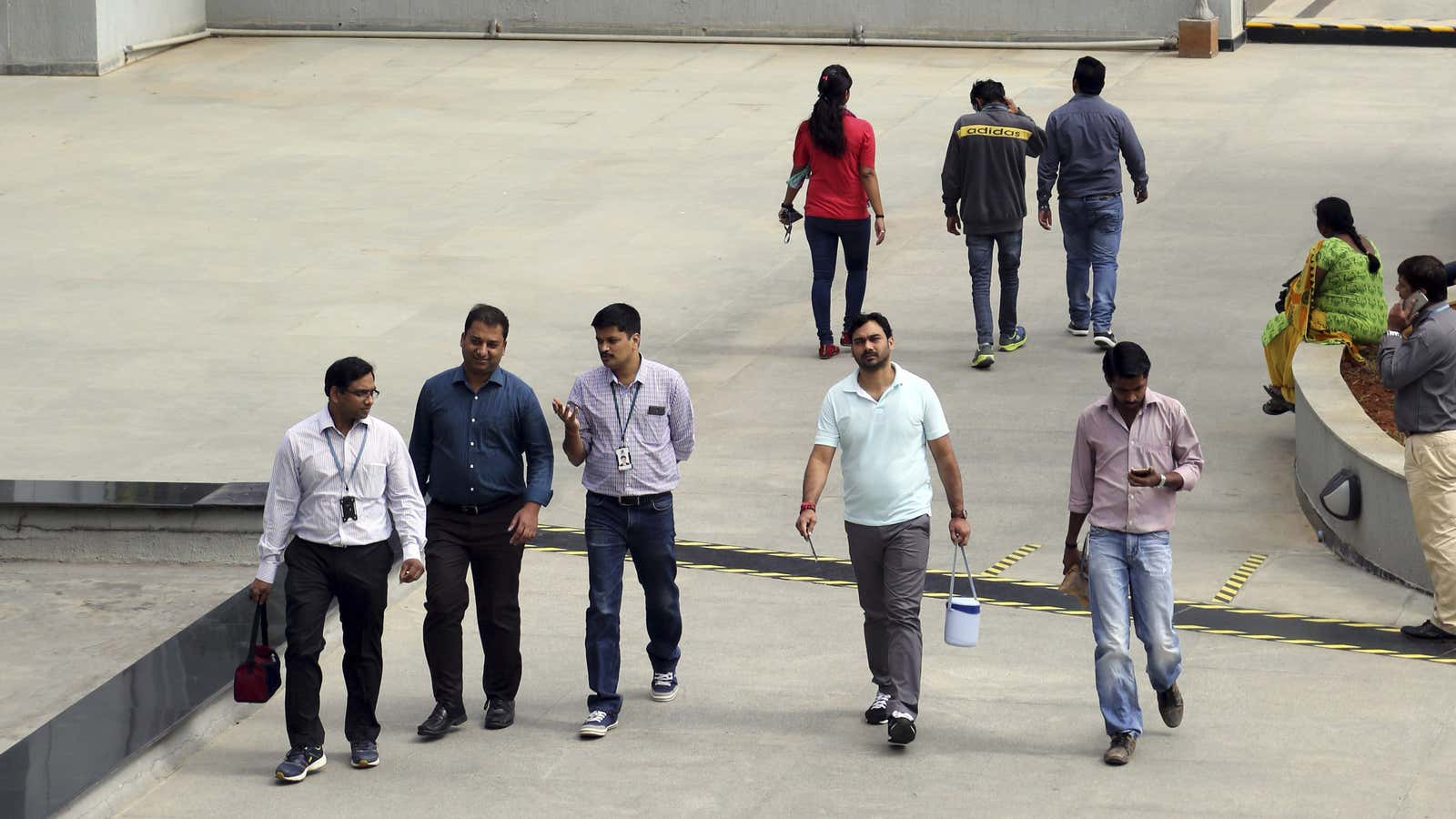US president Donald Trump’s administration has just made life harder for Indian techies and IT companies.
A new policy announced by the United States Citizenship and Immigration Services (USCIS) on Feb. 22 is likely to intensify the scrutiny involved in the process of issuing the much sought-after H-1B visas. Primarily, this change will ensure that this category of visas will be granted only if an applicant is filling a specific specialty role.
“When H-1B beneficiaries are placed at third-party worksites, petitioners must demonstrate that they have specific and non-speculative qualifying assignments in a specialty occupation for that beneficiary for the entire time requested on the petition,” the USCIS said in a press release about the new policy memorandum (pdf) it issued on Feb. 22 to guide its officers.
So far, to approve the visa, the adjudicating officers did not have to review third-party contracts or the exact dates and place of third-party work.
Significantly, the move comes just over a month before the H-1B filing for fiscal 2019 opens on April 02.
“The USCIS is broadly telling its officers that they must look at certain elements of an H-1B petition, which earlier was enforced at their discretion,” Poorvi Chothani, managing partner at immigration law firm LawQuest, told Quartz. “USCIS’s scrutiny of H-1B petitions has been stringent in recent times and it is going to be more stringent now.”
Detailed scrutiny
So, when Indian techies, who make for a majority of the H-1B applicants (pdf) each year, apply for the visas now, they may have to furnish ”evidence of actual work assignments,” the notice said. These include technical documentation, milestone tables, marketing analysis, cost-benefit analysis, brochures, and funding documents.
In addition, the applications will also have to include various contracts, a worker’s itinerary, and detailed statements of work, among other things.
The move, in line with Trump’s “Buy American and Hire American” executive order from last year, will directly impact an entire cohort of Indian outsourcing firms like Tata Consultancy Services (TCS), Infosys, Wipro, and others. These companies often send workers from India, deputing them to third-party sites on a contract basis.
Emails sent to TCS, Infosys, Wipro, and Tech Mahindra, went unanswered.
“Posting employees at third-party worksites is the business model for a lot of Indian companies, large and small,” said Chothani of LawQuest. They have often been criticised for being “job shops that bring in bodies and ship them out to others,” she added. “But that’s really not fair. They’re not just filling IT positions (at the third-party firms). They set up full turnkey projects and plant people at these sites to ensure the platform works glitch-free and somebody is available to troubleshoot highly sophisticated problems.”
But the Trump administration isn’t buying that line.
The USCIS said it has found “significant employer violations” among H-1B employers. This includes “paying less than the required wage, benching employees (not paying workers the required wage while they wait for projects or work), and having employees perform non-specialty occupation jobs.”
In August this year, the agency shared data showing that top IT outsourcers in the US were paying below-average wages.
India’s largest IT services companies have in the past been accused of misusing the H-1B visa which allows a professional to work in the US for up to six years.
In June 2017, a former head of immigration at Infosys accused the company of discriminating against non-south Asians. Erin Green, the former global head of immigration at the company, alleged that he had been unfairly passed over for promotion while foreign workers climbed the ranks. India’s largest IT company, TCS, is also facing a trial for anti-American bias.
Clamping down
The insistence on project time-frames in visa applications is likely a bid to favour locals, allowing foreign workers to be in the US only for a bare minimum time period.
Typically, the H-1B is granted for three years at a time, extendable for another three. However, the USCIS memo suggests that could change:
“While an H-1B petition may be approved for up to three years, USCIS will, in its discretion, generally limit the approval period to the length of time demonstrated that the beneficiary will be placed in non-speculative work and that the petitioner will maintain the requisite employer-employee relationship, as documented by contracts, statements of work, and other similar types of evidence,” USCIS said.
The closer scrutiny will also likely make H-1B extensions tougher to secure. To get the next round of approvals, the “petitioner should also establish that the H-1B requirements have been met for the entire prior approval period,” the USCIS said.
Already, last April, a USCIS guidance issued to the visa officers made the qualifying criteria for computer programmers stricter. Around the same time, the agency also announced multiple measures, including targeted visits to inspect workplaces to check H-1B visa frauds and abuse.
